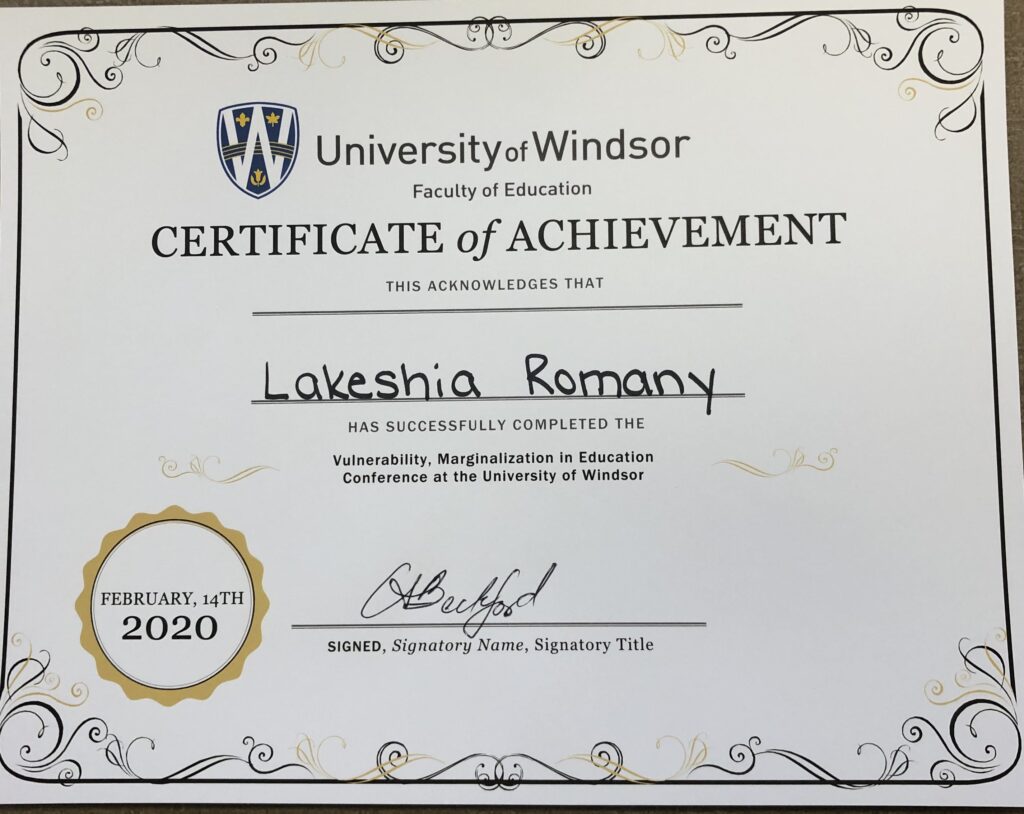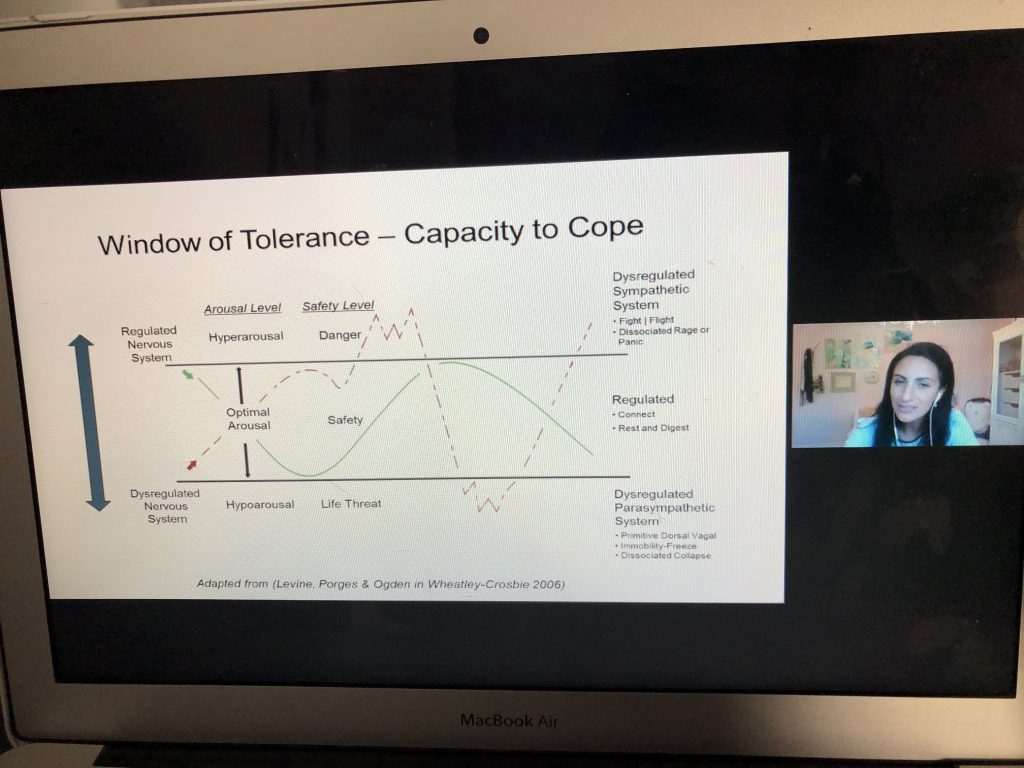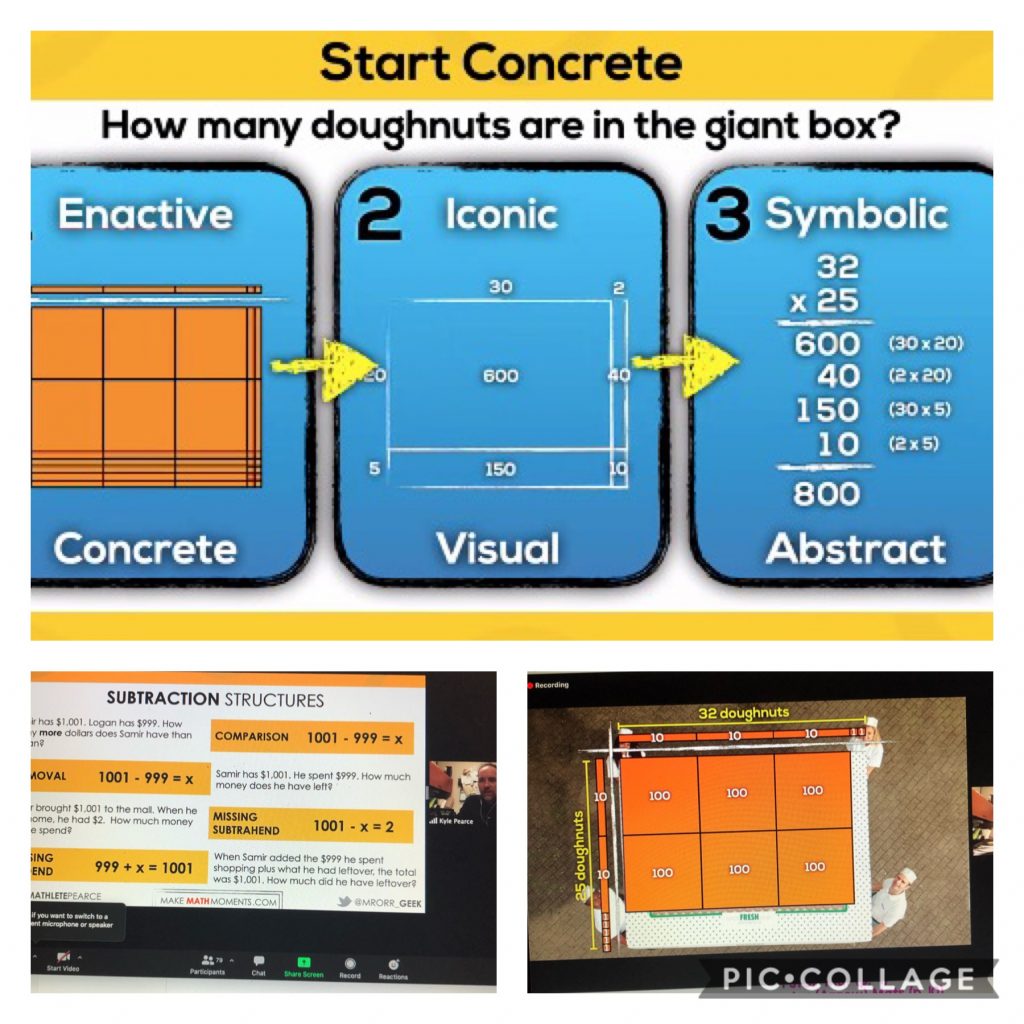Vulnerability, Marginalization in Education Conference

February 14th, 2020
I was fortunate enough to attend the Vulnerability, Marginalization in Education Conference at the University of Windsor. Through my other artifacts and my philosophy of education, it is evident that as an educator I strive to be one that builds positive relationships with all students. One cannot successfully do this if one does not put themselves in the shoes of their students. Although this was difficult, this would help me to try and understand what they were going through and what they needed for student success. The conference was one that is extremely relevant in today’s society, as I have been a victim of racism recently and have witnessed bullying of marginalized students occurring in the classroom in my first placement. It is important to seek out the resources to support marginalized students in the classroom, and through attending this workshop I now have resources that I can use in times of need. Some of the resources include integrating Culturally Relevant Pedagogy into your teaching practice. A set of practices I strongly believe in and am passionate about interweaving into my classroom. More specifically, the strategies encompassed looking at students’ cultural backgrounds as a learning opportunity for all in the classroom and see these backgrounds as student’s strengths rather than deficits. Creating learning opportunities out of show-and-tells, and integrating these into Social Studies expectations when building interrelationships with other countries. Having students share the holidays that they celebrate and turn this into a learning opportunity and evolve this learning into a cross-curricular opportunity with language arts, Visual Arts, and again, Social Studies. I strongly do not condone bullying and exclusion in my classroom, and it was extremely important to learn strategies as to how to teach students to be inclusive. Moreover, this stems from your teaching strategies and practice, I realized that if you are differentiating instruction and lessons, make sure you are doing so that does not promote exclusion and that other students do not recognize this divide. A great strategy I learned outside of the workshop was utilizing SeeSaw. Utilizing this digital platform in the classroom allows the educator to differentiate instruction and assessment to meet the needs of students, without other students in the class becoming aware of this accommodation.. This strategy alone will ensure inclusion in the classroom and create a learning environment where all feel like they belong and are willing to take academic risks.
I also acquired knowledge on learning disabilities and the appropriate terminology that corresponds with certain disabilities. Further, the workshop outlined the signs of specific learning disabilities. This information, will help me detect signs in the future as only about half of students in need of a diagnosis for learning disabilities are actually identified. This means as the educator you need to make sure you are documenting and observing your students for signs of learning disabilities, in order to reach all students. In addition, one must have the knowledge and resources to ensure your students are receiving the appropriate care and education that is necessary for them. I can confidently say that this workshop has prepared me to not only watch for the signs of some marginalized students but also support these students. In the future, I plan to attend other workshops on urban education, as I noticed through my work as a TCSP with the London District Catholic School Board, that this knowledge would greatly benefit me when striving to strengthen relationships with students in diverse communities.
November 6th, 2020
Suicide Talk- Canadian Mental Health Association Workshop

I had the pleasure of attending a suicide prevention workshop hosted by the Canadian Mental Health Association. The presenter Jenny Lee did a fantastic job at getting me as a future educator to start looking at a situation from a trauma-informed lens to help support students to feel safe in my future classroom environment. I was eager to attend this workshop as I believe it is essential to build relationships with students and create inclusive safe environment for students and teachers alike. In order to do that we must first educate ourselves on the varying students that may enter our classrooms, students with mental health conditions included. For some students, they may be coming to school as an escape from a home environment that is anything but safe. A reason why I believe it is crucial to educate myself further as to how I can be an empathetic listener, reflector and advocate for my students. The workshop outlined strategies to use in order to de-escalate a situation a student may be dealing with. Although, the information I received in the workshop that I found most impactful was the idea to model vulnerability in my classroom. Showing students that it is okay to be vulnerable and to “remove our armour”, that in this classroom and within these four walls it is safe for all students and myself to do so. I believe modelling vulnerability is beneficial for students to see and an amazing first step in building relationships with students. Once you accomplish that, not only are able to differentiate curricular material and teaching strategy that best meet the students needs, but you are able to create impactful relationships with students.
December 11th, 2020
OTF Webinar Series: Math Moments to Multiply Math Skills

I was the most excited about taking this ten-part OTF webinar series regarding math skills. Using Math Moments to Multiply Math Skills was facilitated by Kyle Pearce and Jon Orr two life long learners, mathematical educators and leaders for the Ontario Teachers’ Federation. Starting my Bachelor of Education I will admit, I had feelings of uncertainty and unpreparedness when it came to my ability to teach mathematics to the younger generation. I felt as though I did not have the necessary pedagogical tools to effectively teach students what it takes to be successful in the 21st century in regards to math. Growing up my mathematical experiences revolved around an overemphasis in memorization of steps and procedures, with praise given to those that answered quickly, opposed to a deep conceptual knowledge as to why we are using these formulas and steps to begin with. Jon Orr and Kyle Pearce have been working with us every week breaking down number sense, relationships and proportional reasoning and measurement through building our relationships with mathematics by constructing conceptual understanding and procedural fluency. Each week we focus on a new component using the three part math structure, Minds on, Action and Consolidate. A structure I now base my math lessons and units off of, one I previously learned from Marian Smalls. I now feel confident in my ability to select and create mathematical task that require higher-level cognitive demands from students due to my mathematical methodology course with Priscilla Correa and this webinar series. Moreover, I now am acquiring a new set of pedagogical skills that will engage 21st century students. Each week Jon and Kyle would highlight specific technological tools that they use in their lessons that we could also utilized in the remote classroom. Jon and Kyle have challenged my thinking week after week and have created a safe inclusive environment where I feel comfortable to take academic risks and I leave each class feeling rewarded for taking that risk. All qualities I hope to instil in my future classroom.